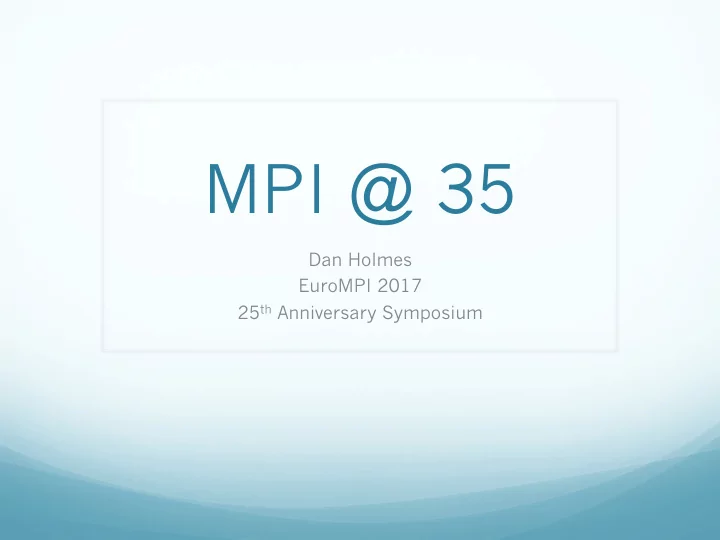

MPI @ 35 Dan Holmes EuroMPI 2017 25 th Anniversary Symposium
Could you please predict something for me?
(Fore)knowledge vs. prediction “Those who have knowledge, don't predict. Those who predict, don't have knowledge.” Lao Tzu, 6th Century BC Chinese Poet We already know what the future of MPI will look like
MPI @ 50 Dan Holmes EuroMPI 2027 35 th Anniversary Symposium
Follow me, I know the way!
Regulation “is the frozen memory of past disaster” @GeorgeMonbiot, quoting Steven Poole (Guardian newspaper) “Much red tape is the frozen memory of past disaster. Modern regulatory regimes as a whole came into being because of public outrage at the dangerous practices of unrestrained industry”
Standardisation “is the frozen memory of past success” Best practice is the frozen memory of past success. Modern standards came into being because of public outrage at the dangerous * practices of unrestrained innovation. * dangerous to portability and so to productivity and consequently to publication rate or to profit
Principles for future of MPI No change, unless there is a very good reason “If it ain’t broke, keep messin’ with it ’til it is” What things are wrong sub-optimal that need fixing? What is the best fix? What things are missing incomplete that need adding? What is the best addition? Who cares? Who wants/needs the fix/new feature?
Current MPI: everything an HPC application needs? Compute • Processes • Groups • Communicators Network • Spawn • Connect/accept • Point-to-point • Join • Single-sided • Collective • I/O Memory • Data-types • Windows • Files • Alloc/dealloc
Current MPI: everything an HPC application needs? Tools • Profiling • Debugging • Adapting Communication • Point-to-point • Single-sided • Collective Abstractions • I/O • Data-types • Files • Windows • Communicators • Processes • Messages
Endpoints/Fine-points Process is the fundamental unit of compute in MPI Ubiquitously MPI process is mapped to OS process What about thread (including SMT & GPU ‘core’)? Who cares? Is hybrid MPI+X actually better? Performance: maybe; abstraction: probably Or task (OpenMP , OmpSs, StarPU, PaRSEC)? Who cares? Task-based runtime developers Tasks improve scheduling for less predictable apps What is the best fix?
Perfect scenario for MPI Regular problem domain Easy to reason about, predict conflicts/bottlenecks Predictable hardware Long-running, repetitive, iterative algorithm Possible to amortise large setup time/cost No surprises Acceptable to dedicate/lock all available resources Who cares? Most traditional MPI users
Performance planning We have relied on compilers for decades I rarely worry about how many registers my code uses MPI middleware augments the compiler Adding distributed-memory communication MPI must shoulder some of the burden How many queue-pairs does my code need? MPI already does some of this but … Expanding the concept of persistence should help
Persistence in MPI Currently have persistent point-to-point Half channel, matching still per operation instance Working on persistent collectives Full channel, 1-to-n, n-to-1, n-to-n as needed Up next: persistent I/O Beyond that persistent point-to-point (revisited) Full channel, or stream, matching during initialisation Completeness only: persistent single-sided?
Less good scenarios for MPI Non-determinism Race-condition (bad?) or asynchronous algorithm Irregularity Irregular meshes, AMR, clustering particles Unpredictability Data-dependent control-flow, graph algorithms Unreliability Hardware may fail, software may fail Hardware performance can vary, e.g. power limits
Faults What can go wrong – and be tolerated or fixed? Process fail-stop because process is the fundamental unit in MPI? Tolerance or resilience? Make user aware of fault & responsible for recovery? Build in redundancy & fail-over to shield the user? Who cares? Users of unreliable hardware systems What is the best fix? ULFM, FA-MPI, FENIX, CR? All?
Sessions
Sessions Problem: initialisation, single controller or race Who cares? Parallel library writers and users What is the best fix? Safe multi-actor initialisation Problem: co-location of workflow ensembles is hard Can be done with connect/accept or spawn or join Who cares? Multi-physics, visualisation/steering, tools What is the best fix? Re-vamp process management? Problem: adaptation grow/shrink is hard Who cares? Dynamic (unpredictable) applications What is the best fix? Co-location plus ULFM shrink?
Future MPI: exactly the same, and subtly different Tools • Profiling • Debugging • Visualising • Steering Communication • Adapting • Point-to-point • Fault-handling • Notifications • Single-sided Abstractions • Collective • Data-types • Stream • Files • Event • Windows • I/O • Communicators • Endpoints • Sessions • Messages
The future is not set. There is no fate but what we make for ourselves.
Recommend
More recommend